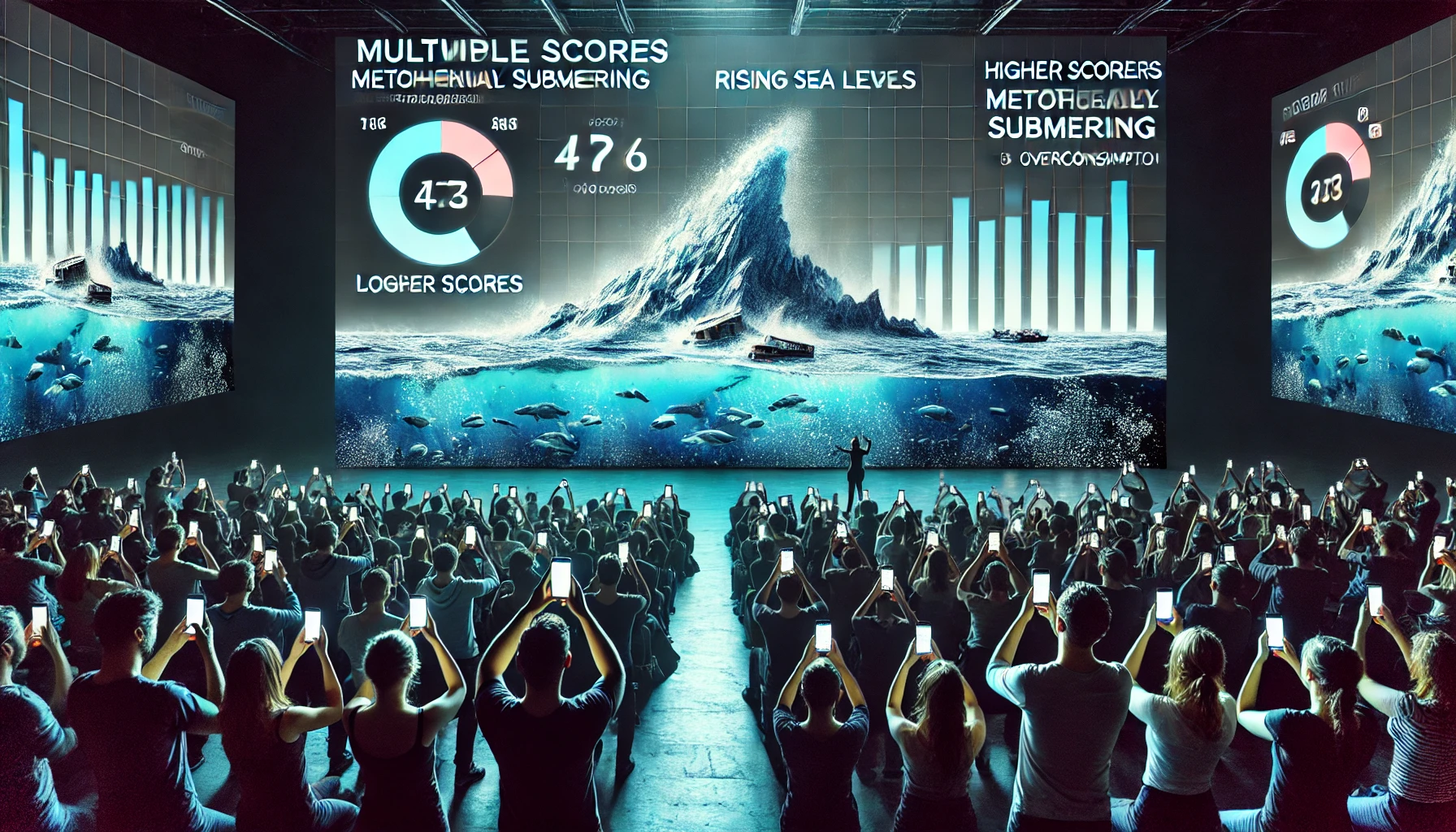← Back to Main
Competition: Relativeness and Absoluteness
7/31/2024, 1:08:26 PM | Jeanyoon Choi

Original Notes (Pre-LLM)
This idea was inspired by Walter de Maria’s Time/Timeless/No Time.
The characteristic of contemporary competition (Education/Job/Economy/Appeal): Our perception and self-esteem are based upon relativity, not absoluteness: We compare with our peers to evaluate the value. Value is perceived as the relativeness of the comparable object, not as the absolute value itself - We are doomed when we think about the absolute value of a certain new object.
Thus, even though the absolute quality of life of people has increased ever since industrialisation, people are never satisfied with themselves, as they keep on comparing relativity, rather than absoluteness.
Thus upon competition, we tend to consume more and more resources - which leads to climate change and many ecological disasters we are facing. Hence, we are still not satisfied. Symbolically representing - we tend to be a hundred times wealthier (in an absolute term) than in the past and consume a hundred times more resources than in the past, but still, our psychological satisfaction remains constant (or even diminished), and yet we continue to compete whilst consuming more resources.
An MDWA performance to represent this idea:
Multiple audiences & each with mobile, a one big projection screen.
They all press on the mobile-first without reckoning what’s happening. The more they press, the more their score goes on - the score is represented as abstractive data visualisation on the big screen. They compete with each other. The score gets larger, higher → And upon, the lower score starts to submerge (a symbolic representation of the sea level rising) → But still the higher ones get higher… And actually few survive in the end.
English Version (LLM-Generated)
Inspired by Walter de Maria's Time/Timeless/No Time, this concept explores the nature of contemporary competition in various spheres of our society such as education, jobs, economy, and appeal. Notably, perception and self-esteem gravitate towards relativity rather than absoluteness. Consequently, evaluations take form through societal norms and comparisons rather than autonomous judgments.
Interestingly, regardless of the substantial improvement in our absolute quality of life since the industrial revolution, satisfaction appears to be elusive. The constant comparison, as opposed to focusing on the absolute, triggers dissatisfaction. The effect is an insatiable society, perpetually in competition, consuming resources excessively and fueling climate change and other ecologic catastrophes.
Symbolically, our wealth may have increased a hundredfold, and our resource consumption also amplified by the same factor compared to earlier times. Still, our psychological satisfaction remains consistent or even dwindles. Yet, we persist in this destructive competitive state, consuming even more resources.
To demonstrate this idea, consider a Multimedia Dance Work Art (MDWA) performance. The performance involves several audiences each with a mobile device and a projection screen. Without full awareness of the implications, each audience starts by pressing on their device, which in turn influences the data visualisation on the screen, increasing their individual score and therefore, increasing the sense of competition.
As the score enlarges, those with lower scores start to metaphorically submerge, symbolising rising sea levels and the destructive aspects of competition and overconsumption. The higher scorers, however, continue to increase, oblivious of the consequences. In the end, only a few survive this relentless competition – a poignant representation of the harsh realities of our current society.
Korean Version (LLM-Generated)
Walter de Maria의 Time/Timeless/No Time에서 영감을 받은 이 개념은 교육, 직업, 경제, 매력 등 사회의 다양한 영역에서의 현대 경쟁의 본질을 탐구합니다. 특히, 인식과 자존감은 절대성보다는 상대성에 중점을 두고 있습니다. 결과적으로, 평가가 자율적인 판단보다는 사회적 규범과 비교를 통해 형성됩니다. 흥미롭게도, 산업 혁명 이후 우리의 절대적인 삶의 질이 크게 향상되었음에도 불구하고 만족감은 여전히 잡히지 않습니다. 절대적인 것에 집중하는 대신 끊임없이 비교하는 것이 불만을 초래합니다. 그 결과, 끊임없이 경쟁하며 과도하게 자원을 소비하고 기후 변화와 같은 생태학적 재앙을 촉발시키는 만족할 줄 모르는 사회가 됩니다. 상징적으로, 우리의 부는 백배 증가했으며 자원 소비도 과거에 비해 같은 비율로 증가했습니다. 그러나 우리의 심리적 만족감은 여전히 일정하거나 심지어 감소하고 있습니다. 그럼에도 불구하고 우리는 이 파괴적인 경쟁 상태를 계속 유지하며 더 많은 자원을 소비하고 있습니다. 이 아이디어를 시연하기 위해 멀티미디어 댄스 아트(MDWA) 공연을 고려해 보세요. 공연에는 각자 모바일 기기와 프로젝션 스크린을 가진 여러 관객이 참여합니다. 관객들은 이의 의미를 완전히 인지하지 못한 채 각자의 기기를 눌러 데이터 시각화를 스크린에 표시하게 됩니다. 이는 각자의 점수를 증가시키고 경쟁 의식을 강화시킵니다. 점수가 커질수록 낮은 점수를 가진 사람들은 은유적으로 잠기기 시작하며, 이는 경쟁과 과소비의 파괴적인 측면과 해수면 상승을 상징합니다. 그러나 높은 점수를 가진 사람들은 결과를 무시한 채 계속해서 점수를 높입니다. 결국, 이 끝없는 경쟁에서 살아남는 사람은 극소수에 불과하며, 이는 현재 사회의 가혹한 현실을 감동적으로 표현합니다.
Tags
competition
relativeness
absoluteness
perception
self-esteem
value
quality of life
industrialisation
satisfaction
resources
climate change
ecological disasters
consumption
psychological satisfaction
MDWA
performance
audiences
mobile
projection screen
score
data visualisation
sea level
Text written by Jeanyoon Choi
Ⓒ Jeanyoon Choi, 2024